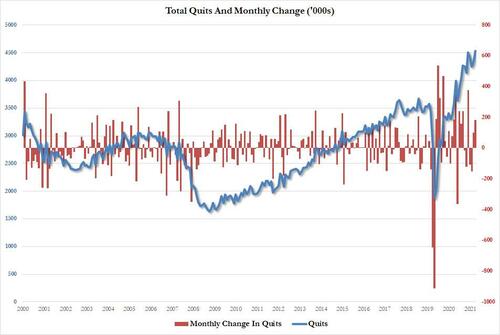Hear, hear!
First up, the problem via ZeroHedge, May 20:
CEOs Are Quitting Their Jobs At The Fastest Pace On Record
It's not just ordinary employees who are quitting their jobs at the fastest pace on record, as the latest JOLTs report showed when it revealed that in March the number of quits rose by another 152,000 to a record high of 4.5 million.
According to Challenger, CEOs are bailing at a record pace as well: in a report published on May 18, business and executive coaching firm Challenger, Gray & Christmas, found that the number of CEO changes at U.S. companies rose 3% to 123 in April from 119 in March.
While that number is 8% lower than the 133 CEO changes announced in the same month in 2021, so far this year, 518 CEOs have left their posts, the highest January-April total since the firm began tracking monthly CEO changes in 2002. The number is up 18% from the 440 CEO exits announced through April last year, and up slightly from the previous high of 513 exits announced in January through April of 2019....
And the solution from the Harvard Business Review, September 24, 2012:
When I was at the Dial Corporation (makers of Dial soap) in the 1980s, executives working at corporate headquarters went through a now-antiquated ritual every day at 11:45. Meetings and phone calls would end and most of the directors, senior directors, various breeds of vice presidents, division presidents, and occasionally our CEO would make their way to the top floor executive dining room for lunch.
Tables were set, uniformed waiters stood at the ready, and a printed menu presented the day’s offerings. Every day that I was in the office, I’d join the same group of friends at our regular table to spend an hour or so eating a splendid company-subsidized, four-course lunch. Suppliers, customers, consultants, and subordinates weren’t welcome — there were separate, private rooms that could be reserved for meetings. The executive dining room was a place for executives to dine with one another.
Executive dining rooms have gone the way of the dodo bird and carrier pigeon, and despite the retro-popularity of Mad Men, there have been few calls for their return. Now widely viewed as elitist, the concept of a separate facility for executives to enjoy formal daily meals together is considered laughable. There are self-service facilities at today’s headquarters where all employees can get lunch to go, or those with the time available can sit and have a meal together. Most days, though, executives in most companies either go out to lunch, eat in their offices, or have lunches brought into meetings, and the day flows through without a break.
But the executive dining room at Dial served an important function. It provided a critical communications nexus for the organization, where issues were raised and resolved in a rapid, fluid, and informal way. Those lunches were a critical organizational lubricant, reducing friction and allowing the gears to turn much more smoothly.
The group at my table included executives from marketing, finance, sales, HR, and corporate development. At the adjoining tables sat executives from all the major divisions and functions except for IT and R&D, who worked in separate facilities. Someone from the senior level of every branch of the organization chart was in the room virtually every day. If anyone needed to quickly resolve a small issue before it became a large one, or find out whom to call about something, or set a time for a meeting, a minute in the dining room could often do the trick.
Conversation at our table would often start with a discussion of the previous day’s golf tournament or football game, a recently viewed movie, or a just-completed vacation. But invariably the talk turned to business. Rumors were verified, plans were shared, trial balloons were floated, and coaching was offered. When I was a newly hired executive my lunch group served as navigators, helping me understand how Dial functioned to a remarkable level of depth.
Today, open floor plans are the dominant model for new construction at corporate headquarters. Glass walls, shared conference rooms, coffee bars, spiral staircases: the 21st-century executive office is ostensibly designed for the kind of fluid, informal interaction we enjoyed in the dining room at Dial. But office seating tends to be grouped according to a single function, division, or span of control....
....MORE
This was obviously written before people stopped going to the office at all but I offer it up as a perk to keep your senior people making the commute.
Plus, it might help avoid this kind of embarrassment from March 2020:
"Mount Sinai hospital leaders holed up in Florida vacation homes during coronavirus crisis"
